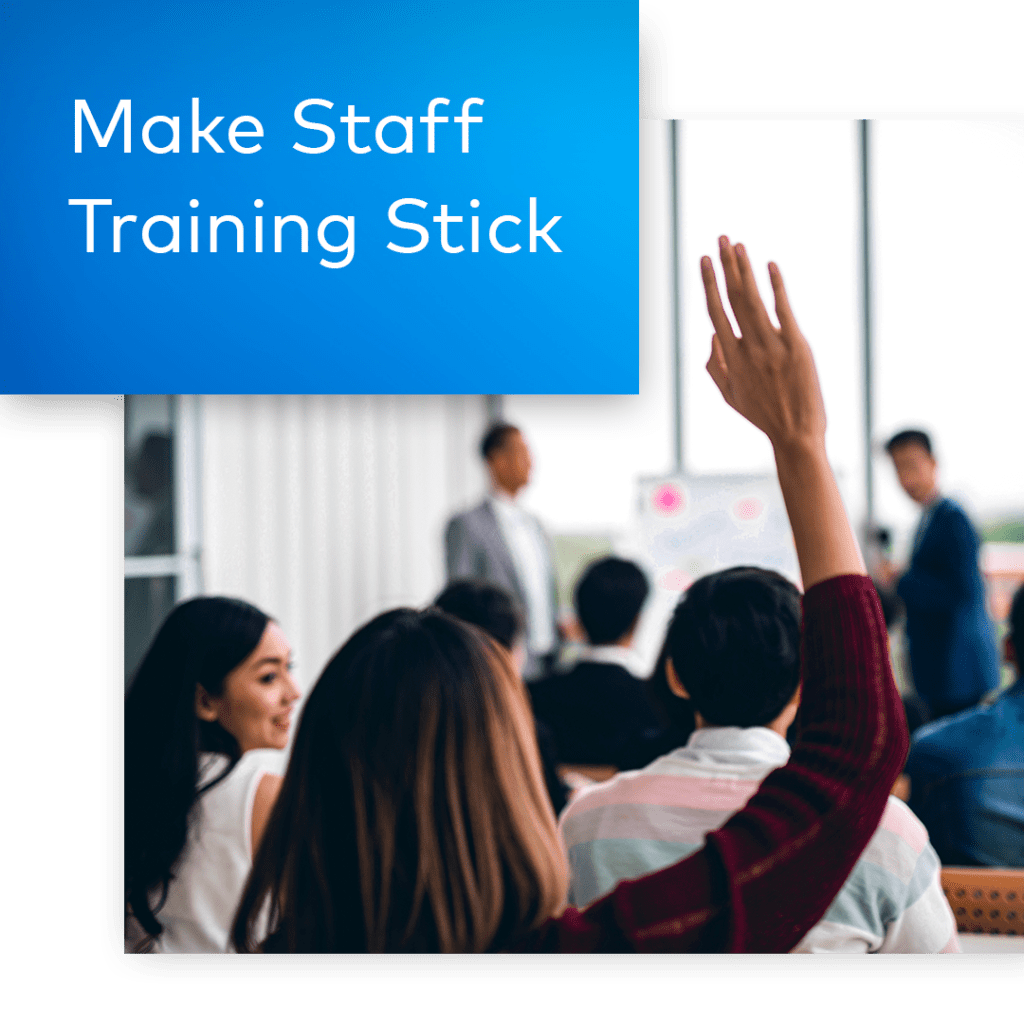Employee skill development isn’t just about moving up the corporate ladder. It’s about equipping employees with the skills, knowledge and opportunities to thrive. Property management companies are increasingly recognizing the need to train their workforce, strategically identify skills and promote internal mobility. Imagine a VP trying to fill a property manager role. How can they quickly identify qualified internal candidates? Or consider a second-year employee wondering which skills they need to advance? Yardi Aspire offers tools to assess, develop and track employee growth, allowing organizations to make data-driven staffing decisions and empowering employees to take charge of their careers. We spoke with Patty Evans, industry principal at Yardi Aspire, about how Aspire can help organizations build a stronger, more capable workforce. Identifying your skills Interviewer: How does Aspire go beyond the basics to evaluate and verify current employee skills? Patty Evans: Aspire is much more than a training tool. It’s a comprehensive talent development solution. Companies use Aspire’s assessment tools to evaluate employees’ current knowledge, identify skill gaps and ensure readiness for specific roles. Aspire helps companies create career pathways for employees to upskill and grow. Matching employees with open positions Interviewer: How can Aspire help identify qualified employees for vacancies? Patty: Aspire allows companies to set specific competency requirements for each role. Employees earn digital badges by completing targeted training modules, skill assessments and scenario-based exercises that prepare them for the real-world challenges of the role. These certification badges are automatically recorded and integrated with HR systems, making it easy for HR teams to identify qualified candidates for open positions. Expanding your role Interviewer: How can Aspire assist employees to find better roles? Patty: Aspire empowers HR teams to market job openings to employees who are already qualified or nearly qualified, encouraging internal...
Online Coursework
The Core of Yardi Aspire
What do you think of when you hear the words Yardi Aspire? If you know Aspire helps property managers train their team, then you may think online courses are what it has to offer. And, you wouldn’t be wrong. But, of course, over the years, Aspire has grown. We’ve added new features and technologies that are benefiting property managers from every component of the industry, including: commercial, affordable, PHA, multifamily, industrial and every other type of property managed by our clients. Yardi launched Aspire in 2013, and over the years it’s grown into a complete learning management solution (LMS). Aspire helps trainers and human resources professionals develop talent, track growth, communicate with employees, host live meetings, maintain compliance with government regulations, and much more. And through all of that development, it’s true that on-demand, online classes are among the most popular features of Yardi Aspire. Every training program relies on content, and Aspire comes with hundreds of predesigned courses covering topics for professional roles found in property management. Aspire clients also have access to tools to design their own custom content. With all of that available standard in Aspire, it’s no wonder many of us still think of the Aspire LMS as primarily a tool for getting on-demand coursework onto the screens of employees. So, let’s take a moment to recognize the benefits of online classes. What better way to do so than by highlighting how we at Yardi use them to train our own team? Enhancing Learning with a Curated Learning Approach Aspire helps Yardi drive seamless, personalized online experiences and workflows for employee tasks and activities. It helps our company craft and consolidate work activities into centralized, simplified and highly accessible assignments. We benefit from Aspire by seeing higher employee success and...
Reimagining Affordable Housing Training
ALCO Talks Training
Our series highlighting affordable housing visionaries continues with a look at the work of Ebonye Edwards, director of learning and development for ALCO Management. ALCO is based in Memphis, Tenn. The company’s 200+ employees serve communities in eight states in the Southern United States. ALCO’s portfolio includes 59 properties with 5,497 units. How did Yardi choose Ebonye to feature in our Affordable Housing Visionary series? It’s her ability to recognize the usefulness of training and to implement technology that keeps ALCO in compliance with the ever changing standards of the affordable housing industry. She keeps ALCO’s in-office and remote workers trained using custom courses, curated learning plans, automated reminders and reporting tools. Q: Ebonye, tell us about your role at ALCO. EE: As Director of Learning and Development, my job is to make sure our team has the resources necessary to not only perform their job, but also to create career opportunities in the complex affordable housing industry. Q: What is your biggest accomplishment at ALCO to date? EE: When I was hired, our learning program used live instructional sessions held in virtual classrooms. I discovered that method to be a bit inefficient because classes would often be faced with unknown delays and absences that may have limited the potential benefits of training. Q: How did you mitigate those limitations? EE: At the time, ALCO was licensing Yardi Aspire, but with limited actual use. Our training courses at the time covered standard topics such as fair housing, sexual harassment and maintaining a drug-free workplace. All other topics, including affordable housing compliance subjects, were taught by our in-house instructors. They’d set a schedule with hopes of reaching everyone who needed training. Despite their best efforts, it was a challenge for everyone to attend. As I was considering the future of training at ALCO, I took a closer look at Aspire. I found that Aspire had affordable housing property management and compliance training content that could supplement, if not replace, much of the live training sessions we had difficulty coordinating across our regional work spaces. We considered the different roles at ALCO, such as property managers and maintenance teams and created learning plans based on those roles. Q: How does your team make sure your learning plans cover everything you need? A: Our Senior Instructional Designer is great at creating custom courses in Aspire. She uses the templates and design tools to roll out coursework to our team, and can normally complete a module in a matter of days. One of the biggest differentiators I have found with Aspire is that it’s not just a medium to get training content onto the screens of learners. Aspire is different because it also has built-in, proprietary content. That content often meets our needs, but when it doesn’t, our design team can easily tweak the classes or build new learning modules from scratch. Q: How does Aspire help ALCO with affordable housing compliance mandates? EE: Yardi helps us keep up with evolving affordable housing industry regulations. When HUD changes go into effect, Yardi Aspire immediately begins work to make sure our training content is compliant. I feel confident that our staff is learning up-to-date processes and procedures and not spending time on anything out of compliance. Q: How does automated content delivery make things easier for ALCO? EE: Centralizing training on a learning management solution, such as Aspire, replaces a lot of administrative work. Instead of keeping track of training schedules for each employee in a spreadsheet or database, we automate things on Aspire. It alerts our team members when they are required to recertify on fair housing, employment standards and on changing laws. Q: Was Aspire helpful for ALCO during the pandemic? EE: Yes. At the time, I felt like ALCO was ahead of the curve compared with what other affordable housing organizations may have been experiencing. For example, Aspire is great for...
Rapid Onboarding
With Yardi Aspire
Could your leasing office staff use additional support? Recent data suggests that industry turnover remains high. And while hiring is on the rise, it still falls short of expectations. If your current team members are burning the candle at both ends, thorough and efficient training of new hires is of the utmost importance. Get your team the support it needs. Read on to learn how you can shorten the time between hiring and training completion without cutting corners. Growth for multifamily operations The Bureau of Labor Statistics reported at the end of the year that employment rose by 210,000 jobs. While the growth is notable, it is also falls short: the number of employed persons is still 3.9 million below its pre-pandemic level. Within the industry, growth comes in small increments. Multifamily residential property managers witnessed job growth by 0.58% from November to December. Employment for residential property managers increased by 3.7% year-over-year. In leasing, employment rose by 0.03% month-to-month and 0.67% year-over-year. Though the overall figures fall short of pre-pandemic levels by 2.6%, the uptick in hiring holds promise. Job growth in apartment operations indicates that onboarding procedures will also be on the rise, offering relief to site staff. Tools for easier onboarding Recent new hires offer much-needed support for site staff. The tasks of training and mentoring, however, can make the transition burdensome to existing teammates. Ease the onboarding process with self-guided and role-specific online training. Online learning management software offers secure 24/7/365 remote access to training materials. Learners benefit from the ability to learn at their own speed and review content as needed. Each lesson can include learning checks to assess strengths and opportunities. For optimal efficiency, automatically distribute role-based learning plans. Plans may cover multiple competency areas, including Yardi software...
Make Staff Training Stick...
9 Tips to Assess Learning
One of the best ways to maximize a training budget is to avoid repeat instruction. When staff learns materials the first time, property managers avoid redundant training costs and quickly enjoy the benefits of properly trained staff. Did you know that assessments play a big part in making sure knowledge is properly absorbed? Assessments are most easily described as the quizzes and tests that pop up during a training session. They aren’t there just to make learners sweat a little bit before wrapping up a course. The real purpose of those tests (more specifically referred to as assessments) is to make sure learners have absorbed the material being taught. When properly written, an assessment can document that a student has gained some knowledge and strategically determine which concepts need to be reinforced before the course can be completed. Here are some tips to consider for your course assessments. Identify the true purpose of the assessment. Before writing test questions, ask yourself what exactly you want to measure with the assessment. Keep all questions focused on that goal. If you include anything else in an assessment, no matter how benign, you may wind up with extraneous, perhaps conflictive data that is not useful in measuring how well the course taught the material. Make sure questions ask about the core learning objectives. Including fun, obscure information during training can be a good way to make training interesting. Just be sure to leave those fun facts out of your post-class assessment. You want to know that learners are acquiring critical knowledge, not the extra stuff that a course may cover. It’s okay to have difficult questions, just don’t make them tricky. Assessments should make students think, but shouldn’t be at all devious or crafty. Trick questions are...
Easier Access
To Yardi eLearning Platform
We have the perfect holiday gift for Yardi eLearning users: fewer usernames and passwords to remember. Yardi eLearning is the newest addition to the YardiOne platform, which means users can get to training resources at the click of an icon. “There are a lot of benefits that come with being part of YardiOne,” said Patty Evans, director of corporate training and Yardi eLearning. “First and foremost is easy access. Being able to get to training materials quickly, including on the job, helps prevent mistakes and boosts productivity. Our clients’ employees now have the fastest and most efficient access ever to Yardi training.” The YardiOne interface was a popular topic at both Yardi Advanced Solutions Conferences in 2017. After each demonstration at YASC, clients asked when their favorite app could be added to YardiOne. “Our eLearning clients expressed a strong demand for YardiOne support. We’re proud to accommodate that demand with this new feature,” said Yves Hajjar, director of product development for Yardi eLearning. Automated User Accounts Also new is the ability for client training administrators to use Yardi eLearning to create user accounts much more efficiently. “Users can have a Yardi eLearning account instantly and automatically set up for them the moment they log in to Voyager for the first time. That saves a lot of time and manual data entry,” said Evans. Trainers can also take advantage of a hybrid option, which automates online user account setup even for users who do not use Yardi software. “This makes it possible for organizations to deliver a consistent experience to employees across the organization, include temps, cleaning crews and other staff who may not use Yardi software,” said Evans. Integrated with Leading SSO Software All of this is made possible by single sign-on (SSO) technology,...
eLearning User Forum
Expert Advice, Peer Insights
Each month, Yardi hosts the critically acclaimed Yardi eLearning ® User Forum. These interactive webinars give users valuable insights into product functionality, updates, and troubleshooting. Engaging. Practical. Smart. Each webinar focuses on topics selected by Yardi users, guaranteeing insights that are relevant and practical. Sample Webinar Topics Include: Drive Student Focus to Training that Matters How to Partner with Your Yardi Voyager Account Manager Make a Great First Impression & Keep It Fresh All Year eLearning Fair Housing Release and Focus Group Hot to Get Management in Your Training Program Facilitators model User Forums after realistic conversations with clients. Co-hosts role-play as tech support specialists and clients. This arrangement creates a fun and informative atmosphere for attendees. Amy McKelvy, Software Implementation Coordinator at Holland Partner Group, attended her first User Forum this year. “The forum I attended was at the end of the second day, so the atmosphere was upbeat and exciting,” she begins. “Forums can be hit or miss, I’ve learned, and some clients use the forum to air grievances, but this one was not that at all. I think Patty [Evans] set the right tone at the start, and led to a very successful sharing time.” Sharing is one key to eLearning User Forum success. Rather than simply lecturing on these topics, facilitators showcase examples from Yardi clients’ eLearning Universities to illustrate each idea. Attendees receive real-life strategies from peers. This client-to-client interaction fosters a sense of community and networking among the Yardi eLearning training community. “I love to provide help and ideas as well as feedback to the eLearning team and other clients. The forum is a perfect opportunity to not only give help, but get other ideas as well,” says McKelvy. Solutions for the Real World In each meeting, facilitators...
Remote Yardi Training...
Brindley & Associates
According to the Association for Talent Development, American organizations spend an estimated $164 billion on employee training on each year. This ranges from 31.5 -56 hours of training per employee. This valuable time is spent simply learning how to optimize performance rather than putting those plans into action. Yardi client Brindley & Associates has cut those costs with the use of one, simple software solution. Accountant Carol Vandenberghe has worked with Brindley and Associates for thirteen years. Overtime, she has seen the company grow its presence in the southeast. To meet it’s more sophisticated needs, the firm recently upgraded to Voyager 7S. The combination of expansion and new software required a more efficient way to pursue employee training. “That was the main reason why we got eLearning,” begins Vandenberghe. “It really helped with the transition, plus we had just hired new employees as well.” Yardi eLearning has helped Brindley and Associates significantly cut costs on employee education and get the most out of Voyager upgrade. “We have so many properties in outlying areas,” Vandenberghe says. “Some of those properties are four hours away. It would take at least eight hours for the property managers to drive back and forth for training. Then to come by the office and have to sit there for two, eight hour days, maybe more.” Those hours are just a portion of the resources wasted on onsite training. “Training event preparation requires a lot of planning. I figure 40-50 hours. That’s an entire week right there,” Vandenberghe says. “Then we have to bring in all of the property managers, pay for their food and hotel, that kind of thing. Plus, it’s inconvenient for the property managers to have to leave when they’ve got tenants coming in to make payments. The...
Game On!
Gamification at Work
Can you remember back to your middle school days? Perhaps it’s a different visual for everyone, but mine is a crystal clear picture with smell-o-vision. You know that “this classroom of preteens is barely discovering deodorant” smell? I remember it well. I also remember the antagonistic nature of boys versus girls in raucous gameplay. Nothing else could whip my classmates into a competitive frenzy then when my fourth grade teacher would split us up into gender-based teams and break out the trivia cards. Oh, the exhilaration of walking up to the white board to triumphantly strike a line through four slashes to make a total of five points. This practice continued well into the sixth grade, where our history teacher allowed our class to finally pick our own teammates and compete in the ultimate quiz game where the answer was provided…you just had to phrase the question properly. “What is, Jeopardy!?” Each team would compete fiercely to rack up the most points, unknowingly learning and retaining information for a final exam. Ah, the thrill of victory. The rules of gamification Gaming techniques like these, incorporating elements like points and leaderboards, are far from new. The concept is rooted in the deeper mechanics of game creation, which has a rich history in both the competition and education realms. Dr. Karl Kapp, assistant director of Bloomsburg University’s Institute for Interactive Technologies, writes: “A well designed game is a system in which players engage in an abstract challenge, defined by rules, interactivity and feedback that result in a quantifiable outcome often eliciting an emotional reaction.” This emotional reaction, when applied to learning, can translate into a sense of confidence, achievement and success. This is why many human resource professionals are now constructing employee development and retention programs...
Cross Training at Work...
Benefits for business
Cross training has been with us for ages, though perhaps not under its formal name. In short, cross training is when an employee who was hired for one position is taught the skills needed to perform additional jobs. It occurs within the workplace naturally, especially in small businesses, yet during the recession larger companies relied on cross training to maintain or maximize output while working with a skeleton staff. The technique may have earned a permanent place in businesses of all sizes thanks to its proven benefits, though several disadvantages challenge whether cross training is sustainable. By implementing cross training strategies in a thoroughly planned, deliberate manner (rather than out of desperation) companies can reap numerous benefits: Cut Overhead Costs When employees can execute multiple tasks, the company stands to decrease overhead costs associated with hiring and training new employees and reduce equipment costs. This can be particularly helpful for start-ups and small businesses who must accomplish more with fewer capital resources. Increased Productivity The company won’t come to a grinding halt when a few members are away at a conference or on vacation. Supporting staff can pick up the reigns when needed, facilitating a consistent workflow that doesn’t miss a beat. Valuable Employees, Greater Possibilities Employees with a broad range of skills are greater assets for their companies. Their adaptability can help businesses run smoothly and contribute to the team efforts more effectively. By understanding multiple roles within the organization, employees gain a holistic understand of their organization and are thus capable of contributing towards overarching objectives and long-term goals. Broader Horizons, Improved Morale Formal cross training provides the challenges that employees need to feel intellectually stimulated and engaged in the workplace. When team members feel that they can make a worthy contribution...
Talking Training
Spotlight on Yardi eLearning
Technology provides many different ways to improve our lives and business processes. Yardi recently launched an exciting new training product that offers both our clients and their employees the chance to improve new hire training and ongoing employee development. Yardi eLearning, developed internally at Yardi with the invaluable input of industry experts, is changing the way real estate professionals are educated on how to best use our market-leading software products. This intuitive learning and content management system provides easy navigation, quick access to training related information, course authorship and publicity for live training events. This flexible system allows clients to use Yardi eLearning for a wide range of training topics (e.g., leasing agent, maintenance, and soft skills training), making it the centralized training hub in your organization. Use it throughout your business to resolve training needs with just-in-time solutions. Whether your goal is to provide new employees with orientation courses or add intermediate to advanced level curriculum to your course catalog for current employees, this solution can handle it all. With multiple offices around the world, Yardi has embraced eLearning internally, as a supplement to our existing instructor-led training efforts. This option allowed us to address a broader range of training needs while directing our resources where they are needed most. While live training will always be our preference for certain topics, we are finding that our employees react well to a blended approach to learning, with some interactive live training and some engaging self-paced courses. Self-paced training offers freedom and flexibility when it comes to scheduling, allowing Yardi employees to meet their clients’ needs while investing in their own professional development. Self-paced courses can also be set up for recertification purposes. When you have a human resources course, like ergonomics, which must be...
Training Property Managers...
The latest education approaches
As property managers are increasingly asked to behave like asset managers, their training is taking a unique turn. Third-party management firms and management departments within investment firms alike are coming up with more comprehensive and sophisticated approaches to upgrade their teams’ abilities. One particularly innovative effort is a training facility created by Cooper Square Realty Inc. in its office at 622 Third Ave. in Manhattan. Along with the customary trappings of a property management company’s headquarters, the multi-family specialist is installing a 1,500-square-foot training center geared to the needs of managers and superintendents. Seventeen stations provide working models of boilers, burners, elevator cabs, electrical systems, water tanks and roofs. The facility will come complete with a model lobby desk that provides the basis for a discussion about reception and the role of the doorman. Managers-in-training receive instruction in the different equipment through a combination of presentations from experts and video segments. Candidates for manager positions must pass tests on all 17 systems. “They need to know the working parts of each (system) and each piece of equipment so they can be effective property managers,” declares company founder & CEO David Kuperberg, who is a civil engineer by training. Having trained more than 500 professionals since opening a facility at the company’s previous headquarters in 2004, he notes that “what the training center has enabled us to do is to hire people at assistant levels and promote them through the ranks, all the way to senior managers.” That is perhaps an extreme example, but other companies have come up with other efforts, some more targeted than others. Colliers International’s training is not specialized for property managers, but its New Generation program aims at addressing what the company contends is a chronic shortcoming in commercial real...












